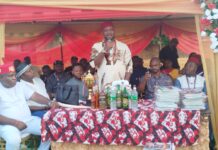Nigeria’s two major oil workers’ unions on Tuesday rejected the federal government’s plan to divest up to 35 percent of its stakes in key joint venture oil assets, warning the move could bankrupt the state-owned energy giant and cripple the national economy.
The Petroleum and Natural Gas Senior Staff Association of Nigeria (PENGASSAN) and the Nigeria Union of Petroleum and Natural Gas Workers (NUPENG), which represent thousands of workers in the upstream and downstream sectors, described the proposal as a “recipe for crisis” that would undermine long-term fiscal stability for short-term gains.
PENGASSAN President Festus Osifo, speaking at a joint press briefing in Lagos, slammed the initiative as a dangerous mortgage of Nigeria’s future. “The government wants to reduce its stake in these assets. In some cases, they are talking of selling up to 35 per cent. But we say no. You cannot mortgage the future of Nigerians for temporary gains,” Osifo said.
He added that the divestment — targeting joint ventures managed by the Nigerian National Petroleum Company Limited (NNPCL), where the government currently holds 55-60 percent stakes — would leave the NNPCL unable to meet payroll, welfare obligations or its contributions to the federal budget. “If these proposals succeed, Nigeria will struggle to generate the revenue required to fund its budget. This is a recipe for crisis, and we will resist it,” Osifo warned, vowing a “100 per cent” rejection regardless of whether the idea originated from the petroleum ministry, finance ministry, NNPCL board or the presidency.
NUPENG President Williams Akporeha echoed the concerns, linking the plan to broader instability in the sector’s regulatory framework. The proposal comes amid President Bola Tinubu’s review of the 2021 Petroleum Industry Act (PIA), which includes reassessing the NNPCL’s 30 percent management fee and frontier exploration deductions to boost fiscal discipline amid global economic pressures.
“The PIA was passed after years of struggle. Investors are just beginning to adapt to it. Now, the government wants to amend it again? That is a dangerous signal,” Akporeha said. “When laws are inconsistent, they scare away investment. The investors are just beginning to understand the PIA, and suddenly government wants to change it again.”
The unions also decried a related push to exclude the petroleum ministry from joint ownership of the NNPC, branding it a “backdoor hijack” that would erode the company’s national mandate. In a direct appeal, they urged Tinubu to personally intervene and curb officials including the finance minister, NNPCL board chairman and group chief executive officer, prioritising national interests over hasty reforms.
Nigeria’s oil sector, which accounts for over 80 percent of export revenues and more than half of government income, has been a flashpoint for labour unrest, with PENGASSAN and NUPENG historically leading strikes and advocacy for asset protection. The current opposition underscores deepening tensions over Tinubu’s economic overhaul, launched since he took office in May 2023, which has included fuel subsidy removal and currency devaluation but drawn criticism for exacerbating inflation and hardship.
The government and NNPCL have yet to respond to the unions’ stance. Osifo emphasised that while workers support efficiency drives, any changes must safeguard jobs and economic sovereignty. “We will not allow that to happen,” he affirmed.





